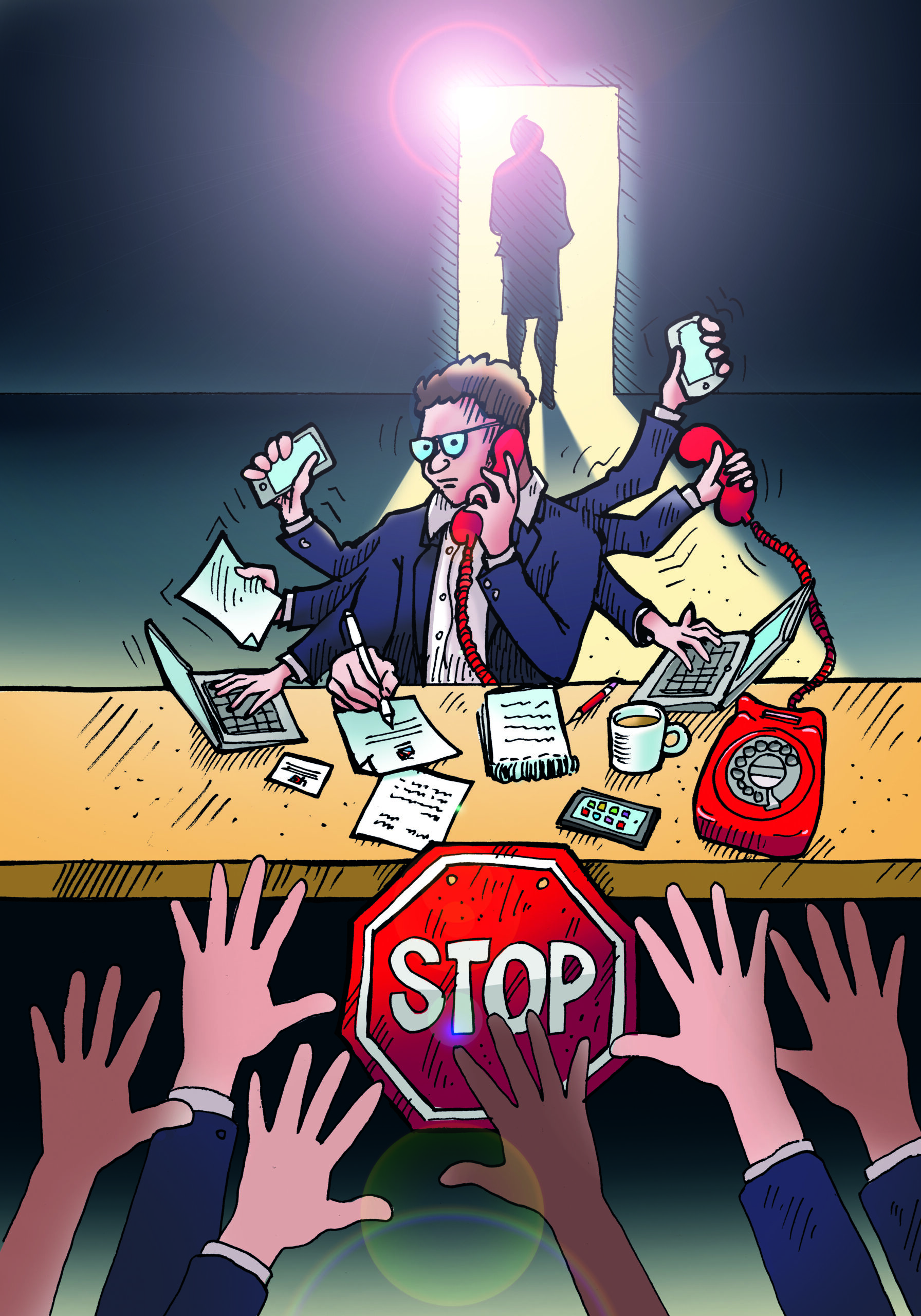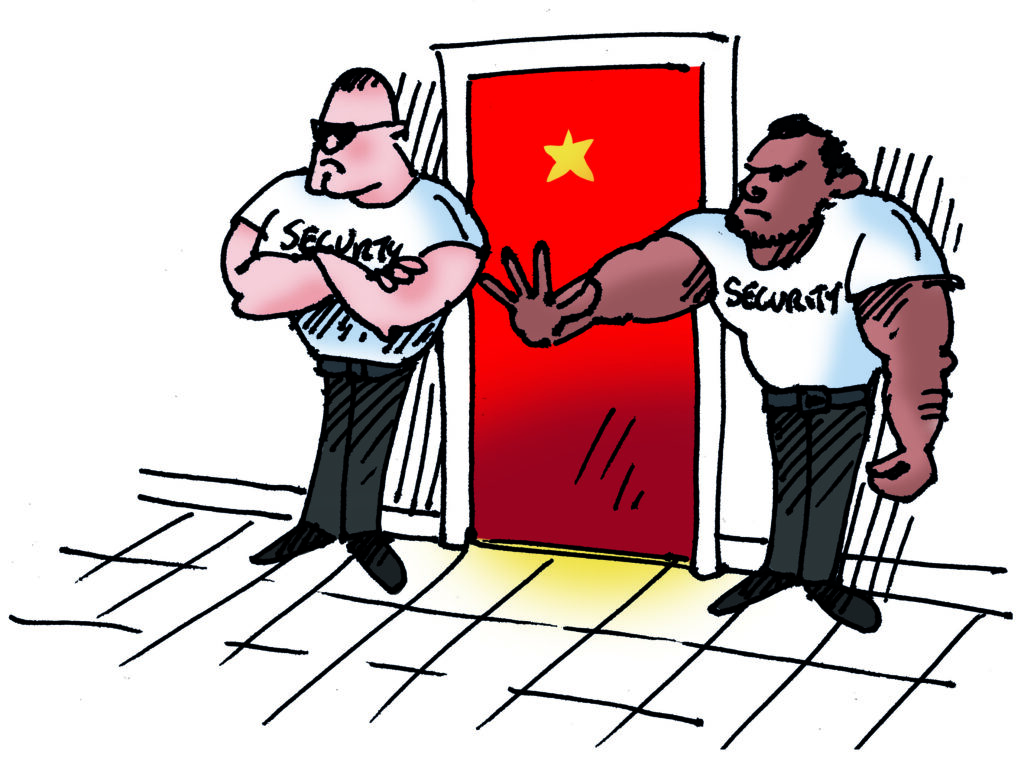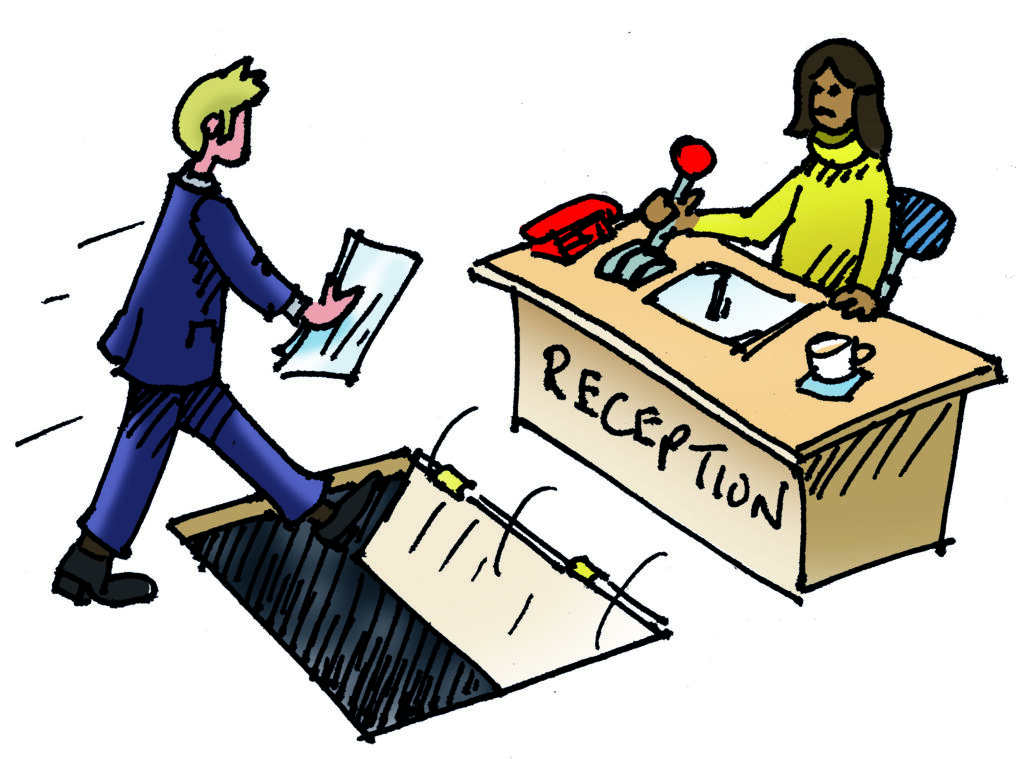 BBC News
BBC NewsBorrowing was £17.4bn last month, the second highest October figure since monthly records began in 1993.

Iris Spark on gatekeeping in the business of journalism, originally published on January 19th, 2022
I was once in a position when I had to interview the rock star Sting and his wife Trudi Styler for a political magazine. I remember the evening vividly; it was snowing outside, one of those February days which serves up snow, but a snow you don’t really want, accompanied by winds which somehow get through your coat and down your neck.
Sting lives on the 16th floor of an apartment block in Battersea, and I arrived amid a strange hush. There were two private chefs preparing Sting’s dinner; and someone with a clipboard milling around. I waited in the kitchen for several minutes in silence, before a fourth person ushered me through.
And there they were: the famous couple, casually enthroned at a table the size of my living room. Westminster was their backing. I will not relitigate the interview, which went smoothly enough. What I remember is afterwards walking with Sting towards a balcony, and seeing the gym bike which presided over the River Thames. You’d feel you were a creature of the skies if you lived up so high.
As we parted company, I had an insight which cured me in one fell swoop of our modern curse: the fascination of celebrity. I realised that we were embarked on two different trajectories: I was about to tell everyone I’d ever met I’d just met Sting. Conversely, Sting was on the cusp of forgetting I ever existed.
As I returned into the snow, I realised too late that there was no tube station for a few miles around. It has sometimes occurred to me afterwards that Sting – or one of his gatekeepers – might on such a filthy night have offered me a car. Or perhaps that if I was in Sting’s position, I’d hope to think of that.
A Question of Fame
But then I think the whole story had its unreality not really because of the man himself – who was friendly, and as down-to-earth as I imagine it’s possible to be while being internationally famous and worth around £400 million.
In retrospect, what made the scene unreal and intimidating was the presence of the silent efficiency of the gatekeepers. It occurs to me now that the miracle of interviewing anyone famous is not that the famous person has let you in; it’s that you got past the gatekeepers.
A friend of mine who once filmed with Robbie Williams once told me: “The trouble with meeting Robbie is he’s always flanked by seven people – you have to take a moment to figure out not just which one he is, but who all these other people are.”
Of course, these visuals also impact on the nature of the conversation that’s possible around a well-known person. But the truth is that nowadays many people don’t get past the gatekeepers.
But why does this matter? It’s because celebrity has become an unavoidable aspect of our lives. Each day, when we wake and check our media, part of what we seek to do is to discover what well-known people are saying about the world. There might even be a sense in which we peer upwards towards the successful, and take our cues from them.

But as a journalist for the majority of my working life, I’ve come to question the process by which this occurs. In researching this article, I’ve found that other journalists are disquieted by the way in which we come to hear what the renowned have to say. This isn’t some gripe specific to journalists – although it is something which many do complain about. In fact, what we hear from well-known people – and how we come to hear it – opens up inexorably onto the wider question of the authenticity of our public conversation.
This in turn impacts on our ability to communicate with one another as a society, and also to solve societal problems.
A Pressing Problem
I was first alerted to the problem of gatekeepers when I first began attending press trips – gatherings of journalists usually organised by the communications or PR team of a venue, business or brand. Just as lawyers might moan about the glacial court system when they gather, or bankers complain about the FCA, when journalists meet they bemoan the difficulty of being able to talk to famous or relevant people.
Put simply, there have been two developments over the past years, both of them detrimental – and even catastrophic – for journalists. The first is a shift away from accessibility; the second is the blandification of what is said when communication is obtained.
The first tendency has been noted by many – not least by former Chancellor of the Exchequer Kenneth Clarke who once told me how it used to be de rigeur in the 1980s for ministers to finish their day’s work then make themselves instantly available for television. As an elected official, it was what you were meant to do. By the time he conducted his last ministerial job in the Cameron administration, that was no longer the case.
Of course, this particular development isn’t just confined to politicians. Most successful people will have someone somewhere controlling their diary – most will have a PR team on top of that.
To talk to that person therefore, you have to go through ‘a gatekeeper’, or, more often than not, ‘gatekeepers’, who will shape the way in which your request is considered by the person you want to talk to. Journalists spend a lot of time talking to gatekeepers.
Some of these, it should be said, are brilliant at their jobs, understand the media, and are journalism-friendly.
One such is James Chapman, former Daily Mail political editor and former director of communications at HM Treasury. Chapman is now a partner at J&H Communications, and explains the gatekeeper aspect of his role: “There is definitely a gatekeeper role to effective PR, though some clients will want more of it than others. As a rule, we encourage clients to engage openly and constructively with the media, even when they’re being criticised. But most will want and expect our advice on which journalists and outlets they should engage with, and the most effective ways of doing so.”
In Chapman’s remarks, the media appears as a fact of life – one which it is better to engage with than not.
So what sort of attitudes does Chapman encounter among his client base? “Some clients have long experience of the media and are confident in managing relationships and media opportunities such as interviews on their own,” Chapman explains. “Others, who have done less, want us to hold their hands more throughout the process. Even the most seasoned client can occasionally get it wrong, and we tell anyone we work with that we will always give them unvarnished advice without fear or favour.”

Chapman has worked for some of the most influential people in the country. He recalls: “When I worked for George Osborne, I was always very clear with him that I would give it to him straight, and he accepted that, though ultimately he was the boss and it was up to him whether or not he accepted my advice. That’s the basis on which I’ve worked with clients ever since.”
The Politics of No
That all sounds sensible – and one can’t at all begrudge busy or successful people going to J+H Communications. Having a team to advise on the stress and complexity which emanates out of the modern media will be vital for those who have reached a certain level. When we interviewed Sir David Attenborough last year, he told us that he gets between 40 and 60 pieces of post a day. He is unusual in choosing to answer those himself; most people in a similar situation choose to delegate.
But not all PR firms, and certainly not all celebrities, are relaxed about the media, and this can lead to a number of problems. The first – and most likely – is that the shutters come down, and that the interviewee fears all the bad that can come out of the encounter, and resorts to a no when the interview in question might have been good for them.
Sometimes this can be perfectly understandable. When we catch up with Sir Tom Stoppard, he is frank about his own needs: peace and quiet. “I can’t keep up, and so I just keep my head down,” he jokes. When he makes an exception for Finito World, it is a very rare one.
Stoppard’s remarks are a reminder that, as Chapman says, each client has their own needs vis-à-vis the media. Stoppard has been a household name for 60 years and, now in his-mid-eighties, needs nothing from anybody. Why talk to the media then? Besides, he knows that if he wants to say something, any newspaper would jump at the opportunity to publish almost anything he says.

There is no shame, then, in a no from Stoppard. But there are different kinds of nos. Often you write to an agent or publicist, right hand or executive assistant, and you don’t hear back from there. You are left to wonder if the response was even read – and if so, whether a different response might have come your way had there been a different gatekeeper in position.
Maev Kennedy, who worked for many years as Arts editor at The Guardian, once told me of her tribulations in talking to the novelist Sebastian Faulks when at a gathering. She was asked to approach him through a publicist. “The PR or publicist said they’d have to check his availability. And I said: “Or I could just go up and talk to him – he’s a perfectly friendly guy!”
This reminds me of a conversation I once had with a senior editor early in my career about the arduousness of pitching for interview. The editor – a well-connected man – said: “What’s the matter with you? Just call them up!”
But that same editor has occasionally got hold of me and asked how to contact people in the time since. For a journalist then, this all becomes precious information. Who is the gatekeeper? Does he or she answer emails? In short, how can I get a conversation?
Often, what journalists really want is a private phone number, and journalists when they’re in a room together occasionally swap this information. This can lead sometimes to a useful lead, and to a well-known person being interviewed without their PR team being aware of it. If this seems like subterfuge then many journalists consider it a necessary one – because the alternative is either that we don’t talk to them, or that we get a sanitised conversation of little interest to anyone.
The Sin of Bland
Good PR turns out to be rarer than one would hope. Clients of PR firms wish to have media engagement, otherwise they wouldn’t have hired the firm in the first place. But the structures around them can lead to another set of sins: the provision of unusable copy.
Damien Gabet, formerly editor of Square Meal a freelance writer for GQ, City AM, and others, explains: “If getting an interview in person was difficult before Covid, it’s now “new-normal” impossible. But what’s interesting is that even speaking to the interviewee on the phone is becoming progressively less likely.”
Gabet explains the process: “The classic line is, “X doesn’t have time to speak over the phone, but will happily answer any questions you have via email.” Of course, this can’t be true: writing them down takes much longer. And because there’s no human interaction, they’re much less interesting.”

In such instances, everything depends on whether the person in question is a good writer: Clive James was noted for his love of the written interview, and Finito World has also conducted an emailed interview with Stoppard. From the interviewee’s perspective, an email exchange can seem like a safe space. They can mind their language and be reasonably sure they’re not taken out of context – thus avoiding the gaffe which has ruined so many a career during this era of ‘cancel culture’.
Chapman wisely points out that the fear of engaging with journalists today is much more to do with fear of the Twitter mob than anything the PR industry is doing: “Politicians are encouraged into instant, snap verdicts, rather than taking a more measured view as they would have in the past. Social media also encourages echo chambers rather than broad discourse. Most alarmingly, facts and truths seem to count for less in today’s public square, and that can be blamed firmly on social media.”
But often, as Gabet continues, the situation is more hopeless still for the journalist: “Sometimes they don’t even write. What you get is written – or at least, edited, by a third-party media sentinel who is trained to be commercially sensitive to the interviewee’s own brand or his/her sponsors.”
This is a far more common scenario than many might realise – the copy that comes back shorn of all personality, which doesn’t seem to have anything individual about it. In such instances, there are three options: to say no; to ask for something more interesting; or, most deadly of all, to run bland copy, safe in the knowledge that people will read it as having been written by someone famous – and therefore give it the benefit of the doubt, and decide to find it interesting, even if objectively, it couldn’t be more boring.
And what’s the result of this? Gabet is frank: “What remains of our contaminated cultural perspective has been squeezed by the gatekeeper’s fear that the interviewee will say something that is at odds with contemporary mores on sensitive subjects – typically identity – which then results in them being “cancelled”.
Brexit and the Gate
For Emily Hill, formerly commissioning editor of The Spectator, and now starting her own publishing house the Woolf Press, the whole thing comes back to politics. Hill explains: “Journalism is in crisis because we are no longer allowed to ask questions. There are two ways of stopping us: declining to answer overtly like the President of the United States – who cuts his press briefings off after he’s made only the points he wants to make – or cutting off access obscurely through gatekeepers who will only grant access to those who know where their crumpet is buttered and won’t risk a fire in the kitchen by toasting it.”
So she views this as serious? Hill couldn’t be clearer: “The whole situation is alienating the general public and pretty damned dangerous for democracy.”
In Hill’s view, Biden is culpable of damaging democracy by refusing to engage with contrary points of view. In the UK, both Boris Johnson and Theresa May in the last two general elections showed a disinclination to do appearances – May refused to debate Jeremy Corbyn, and Johnson would not be interviewed by the BBC’s best interviewer Andrew Neil.
But according to Kate Bright, the CEO of UMBRA International, a security firm which specialises in protecting the wealthy, some well-known people are afraid of what awaits them in the public arena. Bright explains: “In today’s world, security for private clients as well as household names is not only the physical, but also the digital and reputational. Today’s high profile or even the most private client has a dilemma – particularly if the profile they have attained is through opinion voiced both in a professional and personal capacity – to curate and create barriers, or live with the risks that accessibility now presents.”
Like Chapman, Bright thinks that social media has played a major role in inhibiting the public discourse. “The multiple channels for individual expression through social media gives at once huge opportunity for messages to be spread, but also increases the scrutiny, at best, and a focus for criminal activity, at worst. Those that get it right can not only excel in their chosen profession, have a private life and mitigate risk, but it is a 24/7 operation, with digital risks ever omnipresent.”
It might be then that when a journalist is failing to get in contact with someone that that person is simply tweeting over their heads. This is an aspect of modern life, and surely to be accepted and worked with, rather than lamented.
But in Bright’s remarks we also see how far the notion of ‘cancel culture’ has gone to make us feel that notions of ‘safety’ are at issue during discourse – not so much in the conversation itself, but in terms of what may happen afterwards in the so-called Twittersphere.
I have often felt this as an unspoken part of my conversations with the well-known. During that interview with Sting, he said something negative about the then President Trump during the interview, and afterwards, when the tape was off, he confided: “I think I may have got myself in trouble there.”

His tone was of someone who knew there was nothing to do – that he had gone ‘on the record’ and that he had to play by the rules of the game.
I also remember one TV star saying to me: “Off the record – that was off the record” very deliberately into the tape after saying something disobliging about a prime minister. Personally, I’ve sometimes tried to protect people from coming across badly in my pieces, leaving out remarks which I suspected were said in ill temper. But then, other journalists will happily make their subject look bad, if it means that it’s more likely the interview will be reproduced more widely upon publication.
The Burden of Proof
This seems to make PR more necessary than ever. It might be then that what we need isn’t so much any grand reform of the PR industry, but simply better PR.
Chapman explains how it’s important for clients to be open even in crisis situations. “Even where mistakes have been made, it’s better to be upfront and explain how you intend to put things right.”
Chapman admits that there is a wide variety of attitudes out there to the media experience:“Many people fear saying the wrong thing at the wrong time, getting their facts wrong, having their words twisted or taken out of context. Others worry they will come across as overly confident or even arrogant, just because they’re trying to communicate that they’re on top of their game, while others worry about seeming shy or inarticulate.”
But Emily Hill is still critical of many people who want to have their cake and eat it: “Most of it is done under the guise of privacy but no detail is too intimate if it suits the image the rich and powerful want to project. Gatekeeping is ultimately aimed at controlling what people think – and the harder they try to do it the more people will conclude the news is fake and draw their own conclusions about what they’re not being told.”
The question of gatekeepers therefore is at its heart a question of trust about how we treat one another. But this trust works in many different directions: between PR person and client; between PR person and journalist; between reader and writer; and ultimately between all of us. At a time when the issues from the pandemic to climate change, terrorism and identity, couldn’t be more important, it’s more imperative than ever that we make room to address the way in which we discuss them.